I Definitely Struggled With AP US History This Year Because Of The Change In The Format (definitely Missed

I definitely struggled with AP US History this year because of the change in the format (definitely missed the old format when I took AP European History). So I thought I would share some of the resources I used to help me succeed!
general knowledge about the exam
collegeboard - understanding the exam
collegeboard - practice exams (new format)
textbook notes
AP study notes
course notes
helpful refreshers
sparknotes - super helful for last minute review!
helpful videos with fill-in-the-blank study guides
other amazing resources
teacher website
scribd study guide - some topics are missing, but still pretty useful!
another scribd study guide
my own notes from periods 1 to 9
https://drive.google.com/drive/folders/0B8q0xuGsLHKWSHI0WmRLdi1mZGc
my notes are not complete, but i thought i would share it with you guys for anybody who may find it helpful in some way. if you guys do decide to use it or find it useful, message me or something so i know that i have helped others out!
please reblog/like this so that more people who are studying for AP US History can see this! thank you! <3
More Posts from Underhill2 and Others
The Knight - creachurity sequel

A knight swore to protect her Lady no matter the cost. A Lady swore to care for her knight no matter the cost. They think only one can succeed.
You know how I always say that The Creature is the best story I've ever written? I take that back. Her guard just showed her up. After a month of grueling work, I am very happy and relieved to present to you all a story I went through hell and back to see through. I think it might just be my favorite RariTwi story I've ever written, or at the very least, might have my favorite RariTwi moment I've ever written. READ IT HERE Enjoy!
cover art by @sacredlapearl
self discipline tips
here are tips I discovered very recently:
something is better than nothing. 5 minutes of work are better than zero. Just because you missed something on your schedule doesn’t mean you can’t still work on it, even for 5 minutes. Grow and build on this.
second drafts / reviews can be done after.
Don’t think you are going to do your very best work on the first try. Take the weight of perfectionism off your shoulders.
don’t think about doing it. just do it as fast as you can.
build on your productivity, not your failures.
If you come from a past of procrastinating and now feel motivated to change and discipline yourself, do NOT try to do everything at once.
if you have a set of different goals to accomplish, begin with the most important one. Wait until the rotine of working for that one settles in (you feel productive and comfortable-ish), and then begin with the next. Repeat.
this way you’ll be building your way up and not juggling everything at the same time, hoping everything works out.
be patient with yourself, you’ll get there!
set smaller deadlines for your goals
have monthly and weekly-ish deadlines
e.g. if you are doing a project, due 22nd Feb, set personal deadlines, like have Introduction written by 2nd Feb, have Methods written by 10th Feb, have project complete by 18th Feb.
take them as seriously as you possibly can, don’t miss out on yourself.
write realistic daily tasks and don’t stop until you finish them. after them you can do whatever you want
on writing realistic daily tasks, the secret is knowing you can only do so much in one day, but trusting you can accomplish everything in the course of any period of time (a week, or 2 weeks or a month, etc.) because you will combine the work from all these different days.
it’s very tempting to write down all the tasks you need to accomplish in one day to just get over with it, but the real deal is you won’t accomplish half of them. You’ll feel very unproductive then, wich leads to demotivation.
spread daily tasks in the time necessary.
have a consistent sleep schedule.
if your mind isn’t ready everything will fall apart.
have one rest day per week where you plan nothing, do whatever you want except studying. this can be harder than you expect!
(don’t forget these are effective only if you actually put them into practice! good luck babes!!)

snoopy used as an example of a character generated by the hal pcg 6500, advertised in compute! magazine, september/october 1980.
please realize that it gets better. realize that one day you will go to sleep fully content. that one day you will be comfortable enough to smile and not second guess it. sure, you won’t have all the answers. no one ever does. but it will be better. everything will be better and your heart will feel lighter. you’ll believe it when they say i love you and you’ll look at a sunset and instead of wishing on the pink clouds you will close your eyes and say ‘thank u’. it gets better. it always does.
Say thank you to people who make free stuff you can use however. Thank you repeating pattern artists, thank you texture artists, thank you background artists, thank you royalty free music artists, thank you font designers, thank you thank you thank you mwah mwah mwah

To help move away from summary and toward ANALYSIS, it’s important to incorporate strong verbs into your writing when discussing the writer’s rhetorical choices. Below is a list of verbs that are considered weak (imply summary) and a list of verbs that are considered strong (imply analysis). Strive to use the stronger verbs in your essays to help push yourself away from summary and toward analysis: ex “The writer flatters…” NOT “The writer says…”
Weak Verbs (Summary):
says
explains
relates
states
goes on to say
shows
tells
this quote shows
Strong Verbs (Analysis):
Argues, admonishes, analyzes, compares, contrasts, defines, demonizes, denigrates, describes, dismisses, enumerate, expounds, emphasizes, establishes, flatters, implies, lionizes, lists, minimizes, narrates, praises, processes, qualifies, questions, ridicules, suggests, supports, trivializes, vilifies, warns
Powerful and Meaningful Verbs to Use in an Analysis (Alternatives to Show):
Acknowledge, Address, Analyze, Apply, Argue, Assert, Augment
Broaden
Calculate, Capitalize, Characterize, Claim, Clarify,Compare, Complicate, Confine, Connect, Consider, Construct, Contradict, Correct, Create, Convince, Critique
Declare, Deduce, Defend, Demonstrate, Deny, Describe, Determine, Differentiate, Disagree, Discard, Discover, Discuss, Dismiss, Distinguish, Duplicate
Elaborate, Emphasize, Employ, Enable, Engage, Enhance, Establish, Evaluate, Exacerbate, Examine, Exclude, Exhibit, Expand, Explain, Exploit, Express, Extend
Facilitate, Feature, Forecast, Formulate, Fracture
Generalize, Group, Guide
Hamper, Hypothesize
Identify, Illuminate, Illustrate, Impair, Implement, Implicate, Imply, Improve, Include, Incorporate, Indicate, Induce, Initiate, Inquire, Instigate, Integrate, Interpret, Intervene, Invert, Isolate
Justify
Locate, Loosen
Maintain, Manifest, Manipulate, Measure, Merge, Minimize, Modify, Monitor
Necessitate, Negate, Nullify
Obscure, Observe, Obtain, Offer, Omit, Optimize, Organize, Outline, Overstate
Persist, Point out, Possess, Predict, Present, Probe, Produce, Promote, Propose, Prove, Provide
Qualify, Quantify, Question
Realize, Recommend, Reconstruct, Redefine, Reduce, Refer, Reference, Refine, Reflect, Refute, Regard, Reject, Relate, Rely, Remove, Repair, Report, Represent, Resolve, Retrieve, Reveal, Revise
Separate, Shape, Signify, Simulate, Solve, Specify, Structure, Suggest, Summarize, Support, Suspend, Sustain
Tailor, Terminate, Testify, Theorize, Translate
Undermine, Understand, Unify, Utilize
Validate, Vary, View, Vindicate
Yield
a list of simple yet beautiful things to live for:
the feeling of sunlight on your skin
the smell of pastries as you pass by a bakery
being wrapped up in a blanket with a cup of hot chocolate in your hands on a cold night
holding hands with the person you can’t imagine living without
discovering a new favorite song and listening to it on repeat
having a relaxing bath after a long exhausting day
secretly admiring a beautiful stranger you saw on the train
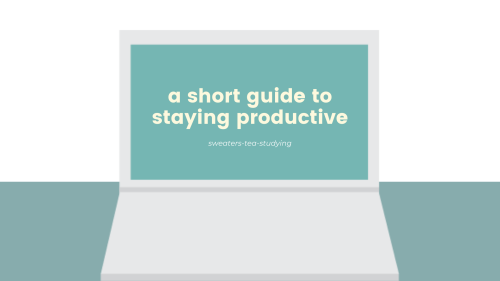
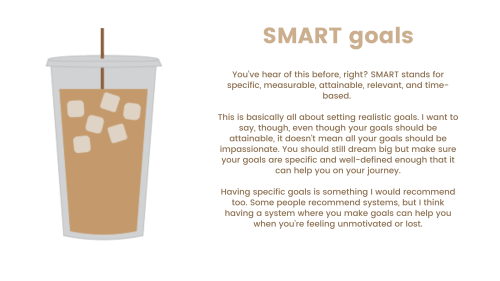
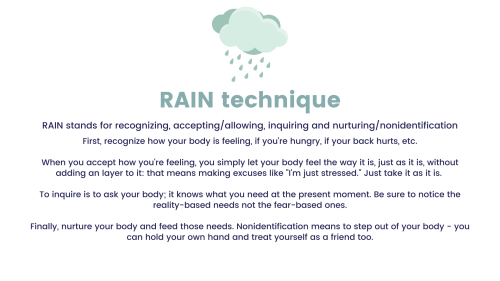
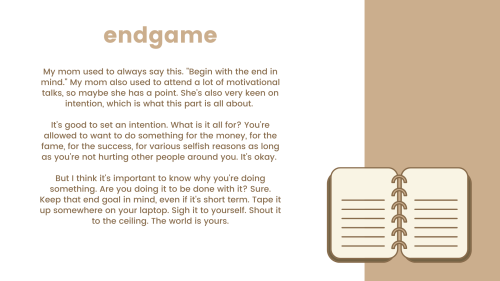
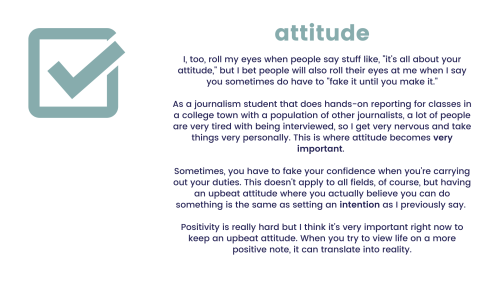
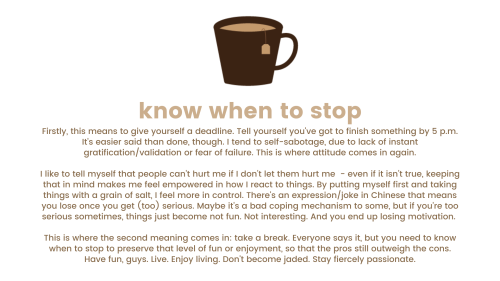
042420
As most people are working and studying from home right now, I wanted to share some concrete, implementable ways you can help yourself feel better. Though I believe productivity and quantity of work done (or lack thereof) doesn’t/shouldn’t translate into your self-worth and how you view yourself, when you get work done, you actually do feel better in your own body.
By the way, it’s the first time I’m formatting a tips/guide post like this, so I apologize that I couldn’t be more concise.
I’ve spoken to a licensed professional counsellor as well as to some professionals who have been working from home for a long time, and some of the advice above is from them. I’m also sharing from my own experience as someone who used to be very productive and an (ex-)overachiever, and still attach a lot of my self-worth to grades and other tangible accomplishments. I hope these slides can help you. In case it’s hard to read, I’ve included it (reworded) in text form if you’d like to read more.
Keep reading
casting spell of pass your exams for anyone going through exams right now
-
 monavrill reblogged this · 3 years ago
monavrill reblogged this · 3 years ago -
 zombells liked this · 4 years ago
zombells liked this · 4 years ago -
 jesuschildren liked this · 4 years ago
jesuschildren liked this · 4 years ago -
 expastellline-blog reblogged this · 5 years ago
expastellline-blog reblogged this · 5 years ago -
 04simmer liked this · 5 years ago
04simmer liked this · 5 years ago -
 menwomenandboats liked this · 5 years ago
menwomenandboats liked this · 5 years ago -
 ed-nxgma liked this · 5 years ago
ed-nxgma liked this · 5 years ago -
 vincent-van-hoes liked this · 5 years ago
vincent-van-hoes liked this · 5 years ago -
 soccerisincorrect liked this · 5 years ago
soccerisincorrect liked this · 5 years ago -
 freakingferret liked this · 5 years ago
freakingferret liked this · 5 years ago -
 minnienonmini liked this · 5 years ago
minnienonmini liked this · 5 years ago -
 studymysweet reblogged this · 5 years ago
studymysweet reblogged this · 5 years ago -
 studythemacrocosm liked this · 5 years ago
studythemacrocosm liked this · 5 years ago -
 oldpomegranates liked this · 5 years ago
oldpomegranates liked this · 5 years ago -
 sarahestyles liked this · 6 years ago
sarahestyles liked this · 6 years ago -
 internetmultifandomfangirl reblogged this · 6 years ago
internetmultifandomfangirl reblogged this · 6 years ago -
 fancrzyweird reblogged this · 6 years ago
fancrzyweird reblogged this · 6 years ago -
 applestorms reblogged this · 6 years ago
applestorms reblogged this · 6 years ago -
 applestorms liked this · 6 years ago
applestorms liked this · 6 years ago -
 multigoddamntrash liked this · 6 years ago
multigoddamntrash liked this · 6 years ago -
 thegoodkindoftrash liked this · 6 years ago
thegoodkindoftrash liked this · 6 years ago -
 childei liked this · 6 years ago
childei liked this · 6 years ago -
 mixedenergy reblogged this · 6 years ago
mixedenergy reblogged this · 6 years ago -
 kingly-studies reblogged this · 6 years ago
kingly-studies reblogged this · 6 years ago -
 novemberrage reblogged this · 6 years ago
novemberrage reblogged this · 6 years ago -
 booksoverlove liked this · 6 years ago
booksoverlove liked this · 6 years ago -
 cxllapsar reblogged this · 6 years ago
cxllapsar reblogged this · 6 years ago -
 johnrobertsantiago liked this · 6 years ago
johnrobertsantiago liked this · 6 years ago -
 txmblrxusxr-blog liked this · 6 years ago
txmblrxusxr-blog liked this · 6 years ago -
 thepurplestapler reblogged this · 6 years ago
thepurplestapler reblogged this · 6 years ago -
 kageyamass liked this · 6 years ago
kageyamass liked this · 6 years ago -
 smones liked this · 6 years ago
smones liked this · 6 years ago

